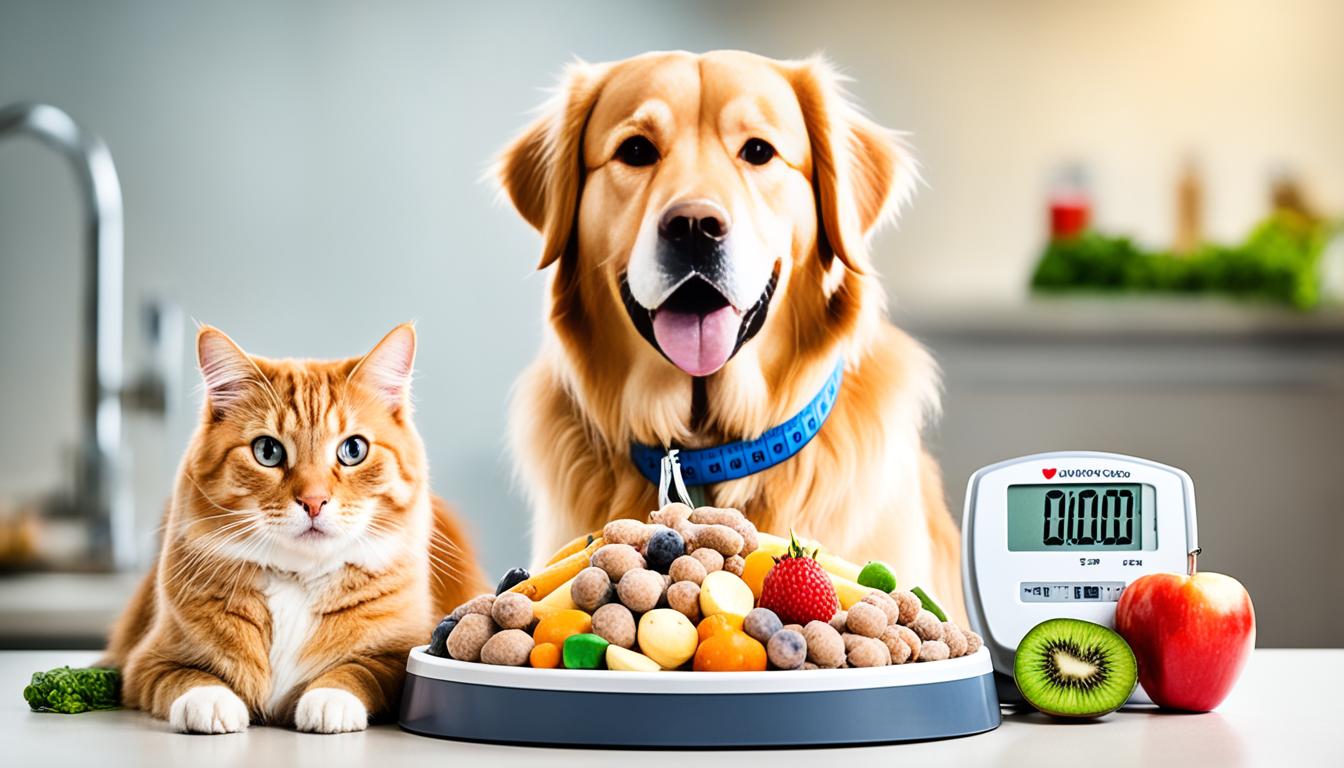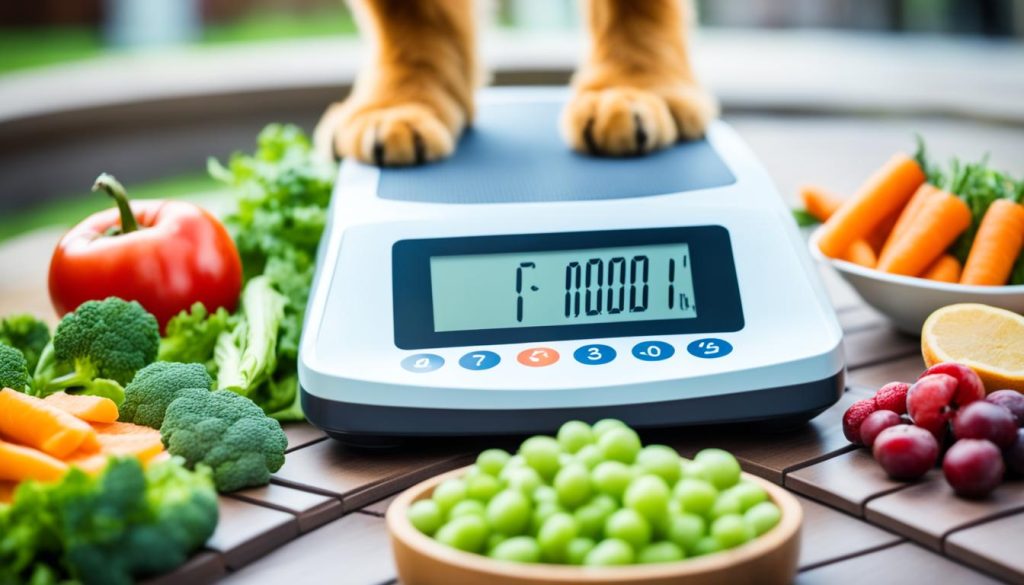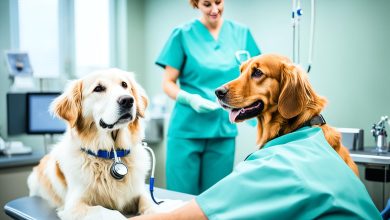Healthy Pet Diet Tips: Weight Management for Dogs and Cats

Weight management is key for our dogs and cats’ health and happiness. Just like people, pets can face weight issues too. We must help them keep a healthy weight. Overweight pets are at risk for many health problems, such as diabetes, heart issues, and more. They might also feel less energetic and have trouble moving around.
Working with a vet is important for your pet’s health. A vet can create a weight-loss plan just for your pet. This plan includes a healthy diet, exercise, and regular check-ups. It’s tailored to meet your pet’s needs.
Picking the right food is vital for pets on a diet. Look for high-quality foods made for weight loss. These foods have less fat and calories but still have needed nutrients. Your vet can help choose the best food for your pet.
Exercise is also important for pets trying to lose weight. It helps burn off calories and keeps muscles strong. Talk to your vet about exercises that are right for your pet. Consider their age, breed, and health when planning.
Key Takeaways:
- Weight loss is important for pets to maintain a healthy and happy life.
- Excess weight can lead to serious medical conditions and a shorter lifespan.
- A veterinary healthcare team should be consulted to develop a personalized weight-loss plan.
- Veterinary weight-loss diets are specially formulated to support weight loss in pets.
- Regular exercise is crucial for weight management and overall well-being.
Why Weight Loss is Important for Pets
Pets that are overweight face serious health risks. Conditions like diabetes, heart disease, and arthritis are more common in heavy pets. They could even have a shorter life due to these problems.
Heavy pets may not enjoy life as much. They might have less energy and more pain. As pet owners, it’s our job to notice and help them slim down.
Keeping your pet at a healthy weight is key. A good diet and exercise can prevent diseases and make their life longer.
Vet visits are important for keeping track of your pet’s weight loss. They can suggest the best food and activities for your pet.
The secret to pet weight loss is a mix of diet and activity. Make changes slowly and stick with it for their health.
The Effects of Obesity on Pets
Being overweight is hard on a pet’s body and mind. It can lead to less energy, harder movement, and more sicknesses.
- Decreased energy levels
- Reduced mobility and agility
- Increased strain on joints and bones, leading to arthritis
- Higher risk of developing chronic diseases, such as diabetes and heart disease
- Poor immune function, making them more susceptible to infections
It can also make them feel sad and lessen their joy in life.
“Obesity is the root cause of many preventable health conditions in pets. By addressing and managing their weight, we can significantly improve their overall health and longevity.” – Dr. Sarah Thompson
Given these risks, it’s important to focus on your pet’s weight loss.
The Lifespan of Overweight Pets
Heavy pets may not live as long. Extra weight causes more stress on their bodies.
Research shows that pets at a healthy weight live longer. By keeping your pet’s weight in check, you boost their chance for a longer, happier life.
The Importance of Weight Loss for Pets
Weight loss in pets is about health, not looks. By slimming down your pet, you can:
- Reduce the risk of developing serious medical conditions
- Improve energy levels and overall mobility
- Enhance their mental and emotional well-being
- Extend their lifespan
This also helps them enjoy life more. They’ll love being active and exploring again.
| Health Risks of Excess Weight in Pets | Lifespan of Overweight Pets | Effects of Obesity on Pets | Importance of Weight Loss for Pets |
|---|---|---|---|
| Diabetes | Shorter lifespan | Decreased energy levels | Reduced risk of chronic diseases |
| Heart disease | Higher risk of complications | Reduced mobility and agility | Improved energy levels |
| Arthritis | Increased strain on joints | Enhanced mental and emotional well-being | |
| High blood pressure | Higher risk of chronic diseases | Extended lifespan | |
| Certain types of cancer | Poor immune function |
Developing a Weight-Loss Plan for Your Pet
Seeking guidance from a veterinary healthcare team is essential for your pet’s healthy weight. They can assess nutritional needs and check for conditions that may cause weight gain.
A weight-loss program for pets should be customized. It should consider their health history. Veterinary diets are key, offering lower calorie but nutrient-rich food. These diets help pets lose weight safely.
Veterinary Guidance: The Key to Success
Working with your vet ensures a safe and effective weight-loss journey for your pet. They’ll adjust the plan as needed for best results.
Regular check-ups are crucial to monitor health and adjust the weight-loss plan. Conditions like diabetes can affect weight. Your vet team will guide you through adjustments to help your pet.
The Role of Diet and Exercise
Exercise is as important as diet for pets to lose weight. Your vet can recommend the right type and amount of exercise. It helps with heart health, muscle tone, and overall wellbeing.
Consider treats in your pet’s total calorie count. Your vet can suggest low-calorie treats that won’t hinder weight loss.
Monitoring Progress and Celebrating Success
Every pet’s weight-loss journey is different. Regular check-ins help track progress and make needed changes. Your vet team will set a timeline for celebrations.
With your vet’s help and a solid plan, your pet can reach a healthy weight. You’ll enjoy a longer, joyful life together.

| Medical Conditions Affecting Weight | Benefits of Veterinary Weight-Loss Diets |
|---|---|
| Diabetes | Support healthy weight loss |
| Thyroid disorders | Lower energy density |
| Medications | Higher protein content |
| Higher fiber content | |
| Lower fat content | |
| Higher concentrations of essential nutrients |
Conclusion
Managing weight is key for pets’ health and happiness. Keeping a healthy weight helps pets stay active and live longer.
It’s important to work with a vet on a weight-loss plan for your pet. A vet can make a diet and exercise plan. They also check on your pet’s health as they lose weight.
Proper care means a good diet, exercise, and vet help. This helps pets stay at a healthy weight. And it leads to a life full of wellness for them. Weight control for pets takes effort, but it’s worth it.
FAQ
Why is weight loss important for pets?
What are the health risks of excess weight in pets?
How can I develop a weight-loss plan for my pet?
What are veterinary weight-loss diets?
How can I monitor my pet’s progress during weight loss?
Source Links
- https://www.avma.org/resources/pet-owners/petcare/your-pets-healthy-weight
- https://www.banfield.com/Wellness-at-banfield/Diet-nutrition-obesity/healthy-pet-weights
- https://vcahospitals.com/know-your-pet/creating-a-weight-reduction-plan-for-dogs




